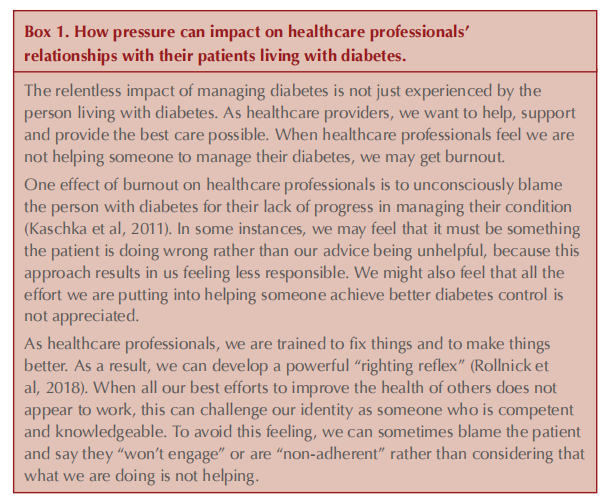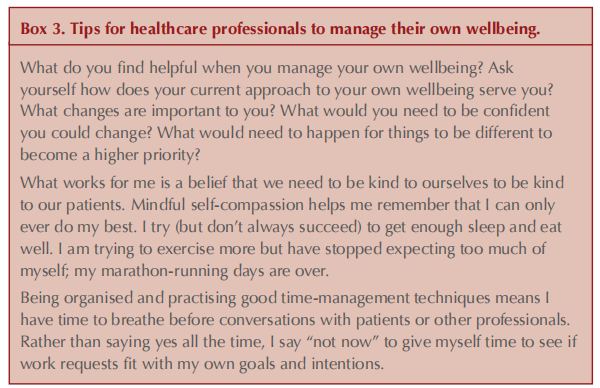What is diabetes stigma?
Diabetes stigma refers to the negative stereotypes, misconceptions and discrimination that individuals with diabetes may face from society, peers and even healthcare professionals. This stigma can manifest in various ways and can have important consequences for people living with diabetes.
Stigma experienced by people living with diabetes is one of the largest barriers to engagement with treatment. People with diabetes may develop negative attitudes towards their own condition and feel guilty, inadequate, embarrassed and angry. They may also have low self-esteem, doubt their own abilities and feel isolated.
How widespread is diabetes stigma?
Abbott’s Let’s Change Perspective initiative set out to understand perceptions of diabetes both among people living with diabetes and in the general population. It aims to confront unconscious bias and reduce diabetes stigma, by changing perspectives to improve the emotional wellbeing of people living with diabetes.
The survey of 1500 people (including 1000 members of the general public and 500 people with diabetes) found:
● 76% of the general population accurately associated diabetes with “insulin”.
● 40% understand that people with diabetes needed to test their glucose levels.
● Nearly 80% see type 2 diabetes as being “caused” by lifestyle choices and excess weight, with misconceptions around the need to consume low-sugar drinks or food.
● 24% blame people with type 2 diabetes as being responsible for having developed the condition.
● A third said they would blame themselves if they were diagnosed with diabetes.
A significant majority of participants (79%) said they are unable to spot diabetes stigma, and many have misconceptions. In marked contrast, 73% of people with diabetes reported negative commentary online, in social media and on TV, and in newspapers, with one in four directly experiencing negative throwaway comments about diabetes.
How can negative and stigmatising commentary impact some people’s ability to manage their diabetes?
Stigma can be experienced as food judgement, social or workplace exclusion, or hurtful comments that may or may not be unintentional. Something as simple as “should you be eating that?” can lead to feelings of blame and judgement. In the survey, one in four adults with diabetes said that others’ opinions have affected their ability to manage their condition. This could include feeling intense discomfort with injecting insulin in public, emotional distress and reluctance to seek medical care. Visible medical devices can also result in stigmatising behaviour and can cause feelings of shame or discomfort.
Fear of having a hypo impacts on how people with diabetes feel others perceive them and how they perceive themselves.
These effects are more common in adolescents and young people, who are already struggling with establishing their personal identity and find the burden of diabetes and their perception of people’s attitude to the burden and demands overwhelming (Freeborn et al, 2013).
The Let’s Change Perspective campaign also found that 27% of women have experienced a negative throwaway comment about their diabetes, compared to 20% of men, whilst more women are likely to experience a negative impact on their emotional wellbeing through the language used to talk about diabetes.
People living with type 2 diabetes experience both weight stigma and diabetes stigma, and they report differential healthcare treatment. The impact of this stigma can result in bingeeating as a coping strategy to deal with negative feelings, lower levels of physical activity and worse self-rated health (Puhl et al, 2022).
What is unconscious bias? Are healthcare professionals at risk of this?
In the Let’s Change Perspective survey, the disconnect between the stigma experienced by people with diabetes and the general public’s lack of awareness of this suggests a widespread unconscious bias around those with diabetes.
Healthcare professionals are not immune to this, and we may even be at increased risk because of the pressures of our jobs (see Box 1). Patients have reported feeling that treatment is being withheld or removed because “they don’t deserve it” (FitzGerald and Hurst, 2017). Unconscious bias is one of the biggest drivers in healthcare disparity (Gopal et al, 2021).

Unconscious bias creates stereotypes that contribute to negative stories and beliefs about groups of people who are perceived as more likely to be lazy, to lie or to be “non-adherent”. They are seen as “that kind of person or patient” who is not following the healthcare team’s advice. Negative stereotypes are unconsciously acted out through the kind of language used when describing someone, such as “not trying hard enough”, “non-compliant” or “failing”. This might make healthcare professionals feel we cannot help, assume the patient would not cope with a continuous glucose monitor or insulin pump, or feel the patient should be discharged.
How can healthcare professionals avoid unintentionally falling into the stigma trap?
Challenging unconscious bias requires us to acknowledge it. Taking time to reflect on how we are feeling about the person we are about to see is a good way to begin. Before we see someone, we may already have a story in our head about what is likely to happen in the consultation. If we believe we are going to be blamed because the person’s diabetes has been difficult to manage, we prepare to defend ourselves. Our emotional posture is mobilised and, without realising it, we prepare by getting ready to blame the patient: “You just need to lose weight”, “Are you taking your medication?” or “You need to do more”.
Instead, consider what the patient wants you to appreciate about them. In turn, what do you want them to appreciate about you? What is the story we are telling ourselves about the patient, and what would be a more helpful story?
Changing the language we use when talking to, as well as talking about, patients can help us shift from a mobilised posture to a tranquil posture – see Language matters: Language and diabetes for some tips. This creates opportunities to think and actively listen for possible shared solutions rather than feeling the pressure to fix things.
How can healthcare professionals manage the relationship with their patients with diabetes in a facilitative and supportive way?
Adopting a motivational spirit within a healthcoaching framework means working in partnership with our patients. It means accepting that things are never perfect and respecting the worth of every person because they are human. Our role is to find strength and value in where the person is in the present, rather than where we think they “should” or “could” be (see Box 2). We need to offer empathy and a stance of hope and optimism, to express an honest belief that how people care for themselves is their choice, and to support their personal right to self-governance.

A motivational spirit requires us to have compassion for our patients. This means showing kindness rather than judgment and humanity versus isolation, as well as adopting a mindful, self-compassionate attitude for ourselves rather than getting overwhelmed by negative thoughts and feelings (see Box 3). Our role is to help our patients engage in self-care behaviours because they choose to, as opposed to doing things because we have told them to do so.

A health-coaching stance gives the individual and the practitioner agency. It creates a space for open, flexible and non-judgemental conversations. The process identifies what the patient’s goal is for the session, invites them to talk about what is happening for them at the moment – what is getting in the way and what is helping them take steps towards this goal – and invites them to identify possibilities and different options to create their own plan to help them take the next steps.
Our role is not to instruct, direct or give advice, but to listen and to trust that the patient knows the answers. They might ask you to tell them how much to change their insulin bolus. You could ask them what they have tried themselves and what worked best. And if you want to share information, ask permission – “would you like to hear about some new insulin, or are you interested in hearing about a new piece of technology?”. After sharing the information, hand the conversation back to them: “So, what do you think about that? What ideas do you have about things now I’ve shared this with you?”.
What impact does a supportive relationship between a healthcare professional and patient have when it comes to patients who are managing their diabetes?
Creating a collaborative and supportive relationship means people feel able to talk about when they cannot follow advice, or to give us helpful feedback so we know what doesn’t help as well as what is helpful. Creating trust with our patients and being open, flexible and non-judgemental means our patients will feel heard and feel safe (Nong et al, 2022). They will be able to let you know what is happening in their life that might make some advice unhelpful or difficult to put into practice; this in turn means we can think together about how to overcome obstacles and find alternative shared solutions that will work more effectively.
What role can healthcare professionals play in reducing the incidence and impact of stigma around diabetes?
Abbott’s Let’s Change Perspective guide has great tips for diabetes allies.
● As a healthcare professional, it is important to be aware of the power dynamic. We have a lot of power, so on a day-to-day basis make sure to speak up if you hear inappropriate comments.
● Support patients if they need to explain the differences between type 1 and type 2 diabetes so that friends and families can understand both conditions are challenging to live with. Suggest resources to help people learn about diabetes, such as Diabetes UK’s The Basics.
● For people who have just been diagnosed, reassure them that diabetes is a complicated condition and is not caused by any one thing.
● Think about how you introduce a conversation about eating behaviours or weight loss with patients who may be struggling with weight as well as diabetes.
● People with diabetes are experts in their own bodies. Allow them to make their own decisions about their condition and what they choose to do.
● Check in with patients and think how you can support them if they are experiencing exclusion in school, university or the workplace.
Where can healthcare professionals signpost patients to access additional support in managing their diabetes?
At the start of a patient’s diabetes journey, encourage them to engage with diabetes community support, such as Diabetes UK and JDRF groups and online communities. People living with diabetes are incredibly generous and welcoming to newcomers. Encourage the person to look around and find what fits for them. There are incredibly inspiring people on Instagram, Twitter and Facebook who will be happy to offer advice and support. To name a few:
● @bromleydiabetic: Insights from Ken Tait, who lives with type 2 diabetes.
● Dawn Adams (Instagram and Twitter) provides helpful advice on both type 1 and type 2 diabetes.
● Vanessa Haydock (Instagram) coaches people with diabetes on health and fitness.
● Blood Sugar Trampoline (Instagram and Twitter) in Ireland is a good source of information for people with type 1 and type 2 diabetes.
As a psychologist, I have a conscious bias towards getting people to talk to someone and making sure that they find the person and approach that fits. Not all mental health professionals work in the same way and not everyone likes talking, but sometimes you need a conversation with someone to find out what will work for you. A good conversation should feel like a neutral and non-judgemental space that will allow people to connect and reflect on the demands of diabetes, which are so much more than watching what you eat and taking medication.
As well as opening access to continuous glucose monitoring to all those who are eligible and would benefit, everyone should also have access to support for the emotional burden that is part of living with a complex and demanding biopsychosocial condition. Some hospital and community teams will be able to offer psychotherapeutic and emotional wellbeing support from a wide range of mental health professionalas.
Finally, the End Diabetes Stigma campaign is another fantastic resource for healthcare professionals and patients alike. I’d recommend all healthcare professionals to endorse the pledge to eliminate diabetes stigma, and to share it across their networks and on social media to raise awareness of this hugely important topic and encourage others to take action.
References
1. FitzGerald C, Hurst S (2017) Implicit bias in healthcare professionals: A systematic review. BMC Med Ethics 18: 19
2. Freeborn D, Dyches T, Roper SO, Mandleco B (2013) Identifying challenges of living with type 1 diabetes: Child and youth perspectives. J Clin Nurs 22: 1890–8
3. Gopal DP, Chetty U, O’Donnell P et al (2021) Implicit bias in healthcare: Clinical practice, research and decision making. Future Healthc J 8: 40–8
4. Kaschka WP, Korczak D, Broich K (2011) Burnout: a fashionable diagnosis. Dtsch Arztebl Int 108: 781–7
5. Nong P, Williamson A, Anthony D et al (2022) Discrimination, trust, and withholding information from providers: Implications for missing data and inequity. SSM Popul Health 18: 101092
6. Puhl RM, Himmelstein MS, Speight J (2022) Weight stigma and diabetes stigma: Implications for weight related health behaviors in adults with type 2 diabetes. Clin Diabetes 40: 51–61
7. Rollnick S, Miller WR, Butler CC (2008) Motivational interviewing in health care. Helping patients change behavior. Guilford Press, New York, NY, USA
This article is excerpted from the Diabetes & Primary Care Vol 25 No 6 2023 by Wound World.


